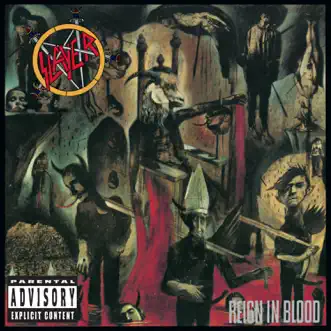About Reign In Blood by Slayer Album
Reign in Blood is the third studio album and major label debut by the American thrash metal band Slayer. Released on October 7, 1986, the album was the band's first collaboration with record producer Rick Rubin, whose input helped the band's sound evolve. Reign in Blood was very well received by both critics and fans, and was responsible for bringing Slayer to the attention of a mainstream metal audience. Kerrang! magazine described the record as "the heaviest album of all time," and a breakthrough in thrash metal and speed metal. Reign in Blood's release was delayed because of concerns regarding its graphic artwork and lyrical subject matter. The opening track, "Angel of Death", which refers to Josef Mengele and describes acts allegedly committed at the Auschwitz concentration camp, provoked allegations of Nazism. However, the band stated numerous times they do not condone Nazism, and are merely interested in the subject. The album was Slayer's first to enter the Billboard 200; the release peaked at number 94, and was awarded gold certification on November 20, 1992. Although the album received no radio airplay, it was the band's first release to enter the Billboard 200, where it debuted at number 127, and attained its peak position of 94 in its sixth week. The album also reached number 47 on the UK Album Chart, and on November 20, 1992 it was certified gold in the United States. Reign in Blood was well received by the underground and mainstream music press. Reviewing for Allmusic, which was established in 1991, Steve Huey awarded the album five out of five, describing it a "stone-cold classic." Stylus Magazine critic Clay Jarvis awarded the album an A+ grade, calling it a "genre-definer," as well as "the greatest metal album of all time." Jarvis further remarked the song "Angel of Death", "smokes the asses of any band playing fast and/or heavy today. Lyrically outlining the horrors to come, while musically laying the groundwork for the rest of the record: fast, lean and filthy." Kerrang! magazine described it as the "heaviest album of all time," while Metal Hammer magazine named it "the best metal album of the last 20 years." Q magazine ranked Reign in Blood among their list of the "50 Heaviest Albums of All Time," and Spin Magazine ranked the album number 67 on their list of the "100 Greatest Albums, 1985-2005." Critic Chad Bowar stated :"1986's Reign in Blood is probably the best thrash album ever recorded. Adrien Begrand of Popmatters observed that: "There's no better song to kick things off than the masterful "Angel of Death", one of the most monumental songs in metal history, where guitarists Kerry King and Jeff Hanneman deliver their intricate riffs, drummer Dave Lombardo performs some of the most powerful drumming ever recorded, and bassist/vocalist Tom Araya screams and snarls his tale of Nazi war criminal Joseph Mengele." When asked why Reign in Blood has retained its popularity, King replied: "If you released Reign in Blood today, no one would give a shit. It was timing; it was a change in sound. In thrash metal at that time, no one had ever heard good production on a record like that. It was just a bunch of things that came together at once." Reign in Blood was recorded and produced in Los Angeles with Rick Rubin. The album was the label boss' first professional experience with heavy metal, and his fresh perspective led to a drastic makeover of Slayer's sound. Steve Huey of Allmusic believed Rubin drew tighter and faster songs from the band, and delivered a cleanly produced sound that contrasted sharply with their previous recordings. This resulted in drastic changes to Slayer's sound, and changed audiences' perception of the band. Araya has since admitted their two previous releases were not up to par production-wise. Guitarist Kerry King later remarked that "It was like, 'Wow—you can hear everything, and those guys aren't just playing fast; those notes are on time.'" Hanneman has since admitted that while the band was listening to Metallica and Megadeth at the time, they were finding the repetition of guitar riffs tiring. "If we do a verse two or three times, we're already bored with it. So we weren't trying to make the songs shorter—that's just what we were into," which resulted in the album's short duration of 29 minutes. King had stated that while hour-long records seem to be the trend; "You could lose this part; you could cut this song completely, and make a much more intense record, which is what we're all about." When the record was completed, the band met with Rubin, who asked "Do you realize how short this is?" Slayer members looked at each other, and replied "So what?" The entire album was on one side of a cassette; King stated it was "neat," as "You could listen to it, flip it over, and play it again." The music is abrasive and faster than previous releases helping to push the gap between thrash metal and its predecessor hardcore punk, and is played at an average of 210 beats per minute. One reviewer summed the album up succinctly: "Due to Reign in Blood’s high punk influence, songs are lightning fast, often containing little or no repetition or predictable structure. Because of this, the album flows seamlessly from one song to another forming one solid half hour of thrash." Following the positive reception to Slayer's previous release Hell Awaits, the band's producer and manager Brian Slagel realized the band were in a position to hit the "big time" with their next album. Slagel negotiated with several record labels, among them Rick Rubin and Russell Simmons's Def Jam Recordings. However, Slagel was reluctant to sign the band to what was at the time primarily a hip hop label. Slayer drummer Dave Lombardo was made aware of Rubin's interest, and made a move to contact him. However, the other Slayer members were apprehensive at leaving Metal Blade Records, with which they were under contract. Lombardo contacted Columbia Records—which was Def Jam's distributor—and managed to get in touch with Rubin, who along with photographer Glen E. Friedman agreed to attend one of the band's concerts. Friedman had produced Suicidal Tendencies's self titled album, in which Slayer vocalist Tom Araya made a guest appearance in the music video for the album's single "Institutionalized", pushing Suicidal Tendencies's vocalist Mike Muir. Around this time, Rubin asked Friedman if he knew Slayer. Guitarist Jeff Hanneman was surprised by Rubin's interest in the band, and was impressed by his work with the hip hop acts Run DMC and LL Cool J. During a visit by Slagel to a European music convention, Rubin spoke with the band directly, and persuaded them to sign with Def Jam. Slagel paid a personal tribute to Rubin, and said that Rubin was the most passionate of all the label representatives the band were in negotiations with. Following the agreement, Friedman brought the band members to Seattle for two days of publicity shots, possible record shots, and photos for a tour book; Rubin felt no good photos of the band had been taken before that point. One of the photos was used on the back cover of the band's 1988 release South of Heaven. The album became an American Recordings album after Rick Rubin ended his partnership with Russell Simmons. It was one of only two Def Jam titles to be distributed by Geffen Records through Warner Bros. Records because of the original distributor’s refusal to release work by the band. Slayer embarked on the Reign in Pain tour with the bands Overkill in the United States and Malice in Europe; they also served as the opening act for W.A.S.P.'s US tour in 1987. After a month of touring drummer Lombardo quit the band; he said, "I wasn't making any money. I think I had just gotten married, and I figured if we were gonna be doing this professionally—on a major label—I wanted my rent and utilities paid." To continue the tour Slayer enlisted Whiplash drummer Tony Scaglione. Rubin called Lombardo daily to insist he return, telling him, "Dude, you gotta come back in the band." Rubin offered Lombardo a salary, but he was still hesitant about returning; at this point Lombardo had been out of the band for several months. Lombardo's wife convinced him to return in 1987; Rubin came to his house and picked him up in his Porsche, taking him to a Slayer rehearsal. Lombardo has maintained an on again/off again relationship with Slayer to the present day. Reign in Blood is regarded by critics as one of the most influential and extreme thrash metal albums. In its "Greatest Metal Bands Of All Time" poll, MTV praised Slayer's "downtuned rhythms, infectious guitar licks, graphically violent lyrics and grisly artwork," which they stated "set the standard for dozens of emerging thrash bands," while "Slayer's music was directly responsible for the rise of death metal." MTV described Reign in Blood as essential listening, and the album was ranked number 7 on IGN's "Top 25 Most Influential Metal Albums." "Raining Blood" and "Angel of Death" are played at almost every live show. When asked during a press tour for 1994's Divine Intervention about the pressure of having to live up to Reign in Blood, King replied that the band did not try to better it, but rather just wanted to make music. In 2006, Blabbermouth's Don Kaye drew a comparison to the band's 2006 album Christ Illusion, and concluded that "Slayer may never make an album as incendiary as Reign in Blood again." Rapper Necro was heavily influenced by the album, and has remarked that it takes him back to the 80s, "when shit was pure."Ektomorf vocalist Zoltán Farkas describes the album as one of his primary influences. Paul Mazurkiewicz of Cannibal Corpse stated Lombardo's performance on the album helped him play faster throughout his career. Hanneman has said that the album is his personal favorite, reasoning it is "so short and quick and to the point." Araya has remarked that Slayer's 2006 album Christ Illusion "comes close," but that "nothing can surpass Reign in Blood for intensity and impact. No one had heard anything like it before. In the twenty years since then, people have got more desensitized. What was over the top then might not be now." Drummer Paul Bostaph who was a Slayer member from 1992 to 2001 first heard the record when he was a member of Forbidden Evil. During a party Bostaph walked towards music he heard from another room, and approached Forbidden Evil guitarist Craig Locicero. When asked what music was playing, Locicero shouted "the new Slayer record." After listening closely to the record, he looked at Locicero, and concluded that his band was "fucked." Along with Megadeth's Peace Sells... but Who's Buying? and Metallica's Master of Puppets, Reign in Blood was among the most commercially successful thrash metal albums released in 1986, a year when the genre reached arguably its greatest popularity. It has also been cited as an influential predecessor to death metal, along with other 1986 releases such as Dark Angel's Darkness Descends and Kreator's Pleasure to Kill. The tracks "Raining Blood" and "Angel of Death" have become almost permanent additions to Slayer's live set, and are Hanneman's favorite tracks to play live. The band played Reign in Blood in its entirety throughout the fall of 2004, under the tour banner "Still Reigning". In 2004, a live DVD of the same name was released, which included a finale with the band covered in fake blood during the performance of "Raining Blood". King later said that while the idea of playing Reign in Blood in its entirety was suggested before by their booking agency, it was met with little support. The band ultimately decided they needed to add more excitement to their live shows, and to avoid repetition incorporated the ideas of raining blood. When asked about using fake blood in future performances, King remarked "It's time to move on, but never say never. I know Japan never saw it, South America and Australia never saw it. So you never know." Although it was omitted from a number of concerts because of short time allotments, Slayer have often said that they enjoy playing the album in its entirety. According to Hanneman: "We still enjoy playing these songs live. We play these songs over and over and over, but they're good songs, intense songs! If it were melodic songs or some kind of boring 'clap your hands' song, you'd be going crazy playing those every night. But our songs are just bam-bam-bam-bam, they're intense." The band was on stage for 70 minutes, which only allowed seven or eight additional songs to be played following the album's play. King stated this arrangement "alienates too many people. In the recent Unholy Alliance tour however, the album was played in its entirety during Slayer's set as the last ten songs to end the show." Def Jam's distributor, Columbia Records, refused to release the album due to its controversial lyrical themes and cover art. Reign in Blood was eventually distributed by Geffen Records; however, due to the controversy it did not appear on Geffen's release schedule. The artwork was designed by Larry Carroll, who at the time was creating political illustrations for The Progressive, Village Voice, and The New York Times. When the art was finalized, one band member was unhappy with the result. However, when another member showed it to his mother, and was given the description "disgusting," they decided to retain it, and felt they were "onto something." The cover art was featured in Blender magazine's 2006 "top ten heavy metal album covers of all time." For the album, Slayer decided to abandon the Satanic themes explored on their previous album Hell Awaits, and write about issues that were more on a street level. Reign in Blood's lyrics include meditations on death, religion, insanity, and murderers, while the lead track "Angel of Death" details human experiments conducted at the Auschwitz concentration camp by Josef Mengele; who was dubbed "the Angel of death" by inmates. The song led to accusations of Nazi sympathizing and racism, which have followed the band throughout their career. Hanneman was inspired to write "Angel of Death" after he read a number of books on Mengele during a Slayer tour. Hanneman has complained people usually misinterpret the lyrics, and clarified, "Nothing I put in the lyrics that says necessarily he was a bad man, because to me — well, isn't that obvious? I shouldn't have to tell you that." The band utilized the controversy to attract publicity, incorporating the Reichsadler into their logo (also the S in the band's name resembles the Sig runes used by the SS), and writing a song titled "SS-3," which mentions Reinhard Heydrich, the second in command in the Schutzstaffel.




